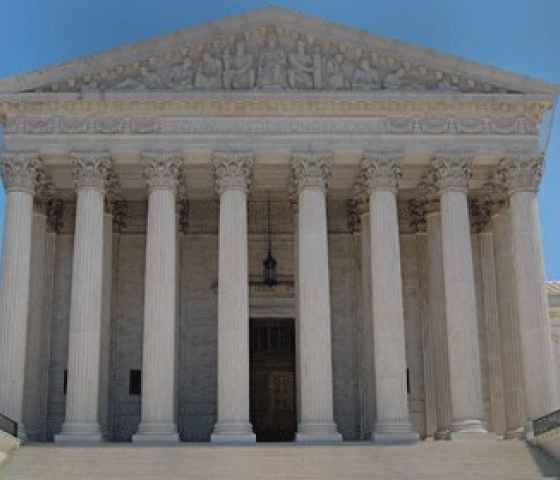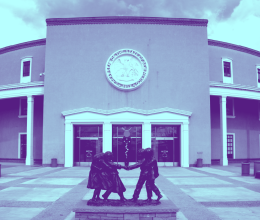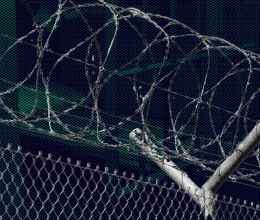One of the well-known truths about any legislative session is that you can expect the unexpected. But this summer’s one-day special session brought a new level of unpredictability. In the months leading up to the session, Governor Lujan Grisham changed her plans again and again, with major changes to the policy proposals being announced almost every week. By the time the session arrived, it wasn’t just that we expected the unexpected; it was that we had no idea quite what to expect until the final hours before it began.
These bills presented grave threats to all New Mexicans experiencing homelessness and mental health issues.
A few short weeks before the session was set to start, I was preparing a presentation for the Courts, Corrections, and Justice committee on the most recent mental health proposal from the governor’s office, which aimed to expand the use of court-order mental health treatment for people facing criminal charges. I poured over the proposal and outlined a number of constitutional concerns. But the night before I was due to present, I was told the governor had scrapped that bill in favor of two new, supposedly more streamlined pieces of legislation designed for the short special session.
When I reviewed the new language, I was alarmed: Far from the simple, common sense changes the governor’s office promised, these bills presented grave threats to all New Mexicans experiencing homelessness and mental health issues.
The two major bills worked in tandem to greatly expand the reach of the involuntary commitment proceedings in New Mexico, vastly extending the criteria under which individuals experiencing mental illness could be forcibly locked into treatment facilities and psychiatric hospitals. And while the governor touted these proposals as strengthening public safety, the irony was they applied only to those found not to be a danger or safety risk, laying bare the true purpose: to remove people experiencing homelessness and mental illness from public view through imprisonment and institutionalization.
While it is true that so many people in our communities are in dire need of mental health treatment, forcing more people into locked facilities is not the answer. We urgently need to expand community care options in New Mexico to address these challenges, rather than turning to the criminal justice system to force people into treatment. So many people who want behavioral health help and support cannot access it in New Mexico because we simply do not have the services. We cannot honestly say that people do not want what they simply do not have access to.
We cannot honestly say that people do not want what they simply do not have access to.
As you may know by now, the ACLU of New Mexico, along with dozens of community advocacy organizations and mental health professionals, successfully pushed back on these bills through a letter to the governor, opinion editorials, emails to legislators, and committee testimony. Though we were able to stave off the biggest threats to our communities, our work is not done. After all of her priority bills failed in session, Governor Lujan Grisham has taken her agenda to town halls, and has doubled down on harmful and misleading rhetoric that stigmatizes and scapegoats people with a mental illness.
We have to keep up the work in the interim process to ensure that any new proposals for the 60-day session not only protect people’s constitutional rights, but actually help solve the underlying issues that our communities are facing.
The New Mexico Supreme Court Commission on Mental Health and Competency, made up of judges, attorneys, behavioral health advocates, and law enforcement, which has been working to improve mental health outcomes for system impacted people for years, has recently circulated an improved bill. This proposal, which seeks to give people multiple off-ramps from the criminal legal system and into community treatment, is a step in the right direction. But we must not abandon the larger fight to invest in and create more community care options for people that would prevent them from ever having to go through the criminal legal system to begin with.
So many people who cause harm to others have been harmed themselves.
As a country, we’ve been obsessed with punishment – even when we disguise it as treatment. We’ve fallen prey to the harmful idea that if we lock people up, whether in prisons or psychiatric units, our problems will be solved. In reality, this response will only exacerbate the very problems we seek to solve. So many people who cause harm to others have been harmed themselves. Locking them up only worsens the cycle of injury. After incarceration and institutionalization, people often leave with increased trauma, little resources, and a mountain of obstacles preventing their success. To build a truly safe world, we need investments in healing, not new forms of harm.
I am grateful that the governor’s special session ignited an important dialogue about treatment, but I hope that as we head into the 60-day session, we can dig deep and think about what treatment actually means. I hope we can find ways to overcome our reliance on the criminal legal system to solve every societal issue, and finally work towards a more creative, compassionate, and effective approach to the safety we all need and deserve.




